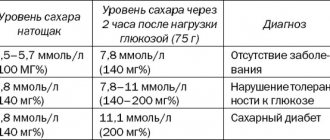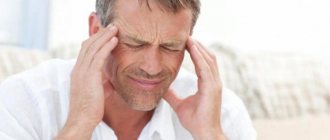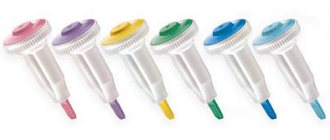Hypertension may mask menopause
Often women mistake the symptoms of menopause for problems with blood pressure. This happens especially often during premenopause, when the cycle is still regular.
So, hot flashes are similar to high blood pressure: the woman suddenly turns red and feels stuffy. Often, the pulse quickens, the heart pounds in the chest, as if after a fast run or hard physical work.
In such a situation, it is best to measure the pressure immediately during an attack. It is advisable to analyze what preceded the attack and how it proceeded. If it occurs after drinking cocoa or alcohol, spicy food, or literally out of the blue, is accompanied by sweating, and does not last long (a few minutes at most), then most likely it is a hot flash. If it arose against the background of a change in weather, emotional experiences, the bad condition did not go away after half an hour, headaches appeared, then it is more like an increase in blood pressure.
Doctors recommend keeping a blood pressure diary for about 10-14 days: twice a day, morning and evening, preferably at the same time, you should record your blood pressure and pulse. This will allow you to assess what pressure is normal for you and understand whether there is a predisposition to its fluctuations.
Do not diagnose yourself and do not take “pressure pills” that your friends take, even if the tonometer readings differ from the traditional 120 to 70. It may well turn out that your blood pressure does not need correction, and your condition is caused by hormonal changes. Therefore, if you have not suffered from pressure changes and suddenly encountered the conditions described above, it is also worth visiting a gynecologist and getting tested for hormones to understand whether the first stage of menopause has occurred.
How to reduce symptoms and signs of menopause in women: useful tips
With the onset of menopause, it is recommended to adhere to the following recommendations:
- Move more, engage in feasible sports and physical exercise.
- Master breathing and relaxation techniques
- Eat right and stay hydrated.
- Exercise your brain (read, solve crosswords, learn foreign languages).
- Perform exercises that train fine motor skills.
Remember: a correct lifestyle and timely consultation with a doctor if necessary will allow you to reduce unpleasant symptoms during menopause!
Sources:
- SOFT CLIMAX. Zhexembinova R. S. // Bulletin of surgery of Kazakhstan. – 2011. – No. 4. – P.98.
- MODEL OF SPECIALIZED CARE FOR WOMEN WITH Climacteric Disorders. Kholodova L.N., Protopopova N.V., Kravchuk L.A., Sharifulin M.A. // Siberian Medical Journal (Irkutsk). – 2004. – P. 76-77.
- Guide to outpatient care in obstetrics and gynecology / ed. V. E. Radzinsky. — 2nd ed., revised. and additional - M.: GEOTAR-Media, 2014. - 944 p.
- Gynecology: textbook. for universities / ed. G.M. Savelyeva, V.G. Breusenko. — 4th ed., revised. and additional - M.: GEOTAR-Media, 2012. - 432 p. : ill.
- https://www.medicinenet.com/menopause/article.htm
- Menopausal syndrome. EAT. Vikhlyaeva // Guide to endocrine gynecology. - M.: MIA. - 1998. - P. 603-650.
- Therapy of depressive disorders in general medical practice. Dubnitskaya, E.B. A.V. Andryushchenko // Modern psychiatry. – 1998. – No. 2. – pp. 10-14.
- Menopause and perimenopausal period. R.B. Jaffe // Reproductive endocrinology. Edited by S.S.K. Yen, R.B. Jaffe. – M.: Medicine. - 1998. - T.2. – pp. 560-586.
- https://www.menopause.org/for-women/menopauseflashes/menopause-symptoms-and-treatments/are-we-there-…
- https://www.healthline.com/health/menopause/symptoms-signs
- https://nccih.nih.gov/health/menopause/menopausesymptoms
Symptoms of menopause provoke high blood pressure
Pressure during menopause in women can indeed increase - both occasionally and gradually, exceeding normal values and creating conditions for the development of hypertension.
- During menopause, there is a strong craving for sweet and high-calorie foods, which leads to an increase in the amount of fatty tissue. In this way, the body tries to cope with the lack of estrogen, since adipose tissue can also produce these hormones. However, as a result, the harm outweighs the benefit: the woman quickly gains weight. And excess body weight is one of the main risk factors for the development of hypertension.
- Emotional swings and irritability over trifles are another direct cause of high blood pressure. After all, even if the reason was insignificant, the woman is truly worried.
In this situation, it is imperative to take care to ease the symptoms of menopause. For example, 5-hydroxytryptophan helps control appetite, and in combination with B vitamins stabilizes the emotional state, phytoestrogens smooth out estrogen deficiency, which is the “culprit” of symptoms. You can choose a drug that will contain all the mentioned components, for example, Mense.
When do the first signs of menopause appear: the age of women
The time of onset of this period is individual for each woman and depends on a number of factors (heredity, general health, number of births in history). On average, the age at which the first symptoms of menopause appear is 50 years, but in some cases, the onset of menopause can be observed at both 40 and 60 years. The greatest intensity of menopause symptoms usually persists for a year, after which it gradually decreases and ends.
Separately, it is worth noting early menopause. Symptoms of this condition can begin as early as 28-30 years of age. If the first signs of menopause occur so early, there is a risk of developing cardiovascular diseases and osteoporosis at a young age.
Expert opinion
The onset of early menopause quite often coincides with a woman’s period of social and sexual activity. Therefore, reducing the intensity of menopause symptoms is important not only from a medical but also from a social point of view.
Obstetrician-gynecologist of the highest category Oksana Anatolyevna Gartleb
Tests for menopause
Laboratory tests include blood tests to determine levels of several hormones:
- estradiol is produced by the ovaries and is responsible for the development of eggs and menstruation; during menopause, its concentration decreases;
- Anti-Mullerian hormone is produced by the follicles themselves and regulates their development. By its level, you can determine the supply of full-fledged eggs and, accordingly, the possibility of getting pregnant;
- inhibin B is produced by the ovaries, and a decrease in its concentration in the blood indicates a weakening of ovarian function;
- follicle-stimulating hormone controls the release of estradiol;
- luteinizing hormone affects ovulation processes; its level increases with ovarian pathologies;
- prolactin is responsible for the regulation of menstruation, and in their absence, its concentration decreases;
- thyroid-stimulating hormone: its level is determined to exclude thyroid deficiency (hypothyroidism), which manifests itself with similar symptoms.
Among instrumental examination methods, pelvic ultrasound is used for the differential diagnosis of other diseases, the symptoms of which resemble menopausal changes.
Other examinations (ultrasound of other organs, mammography, general and extended biochemical blood tests, urine tests, smears for the presence of cancer cells) are prescribed in case of complicated menopause or suspicion of concomitant disorders.
Menopause symptoms
Tides
Hot flashes are a sudden feeling of heat in the face, neck, chest and arms, which is accompanied by fever, sweating and a feeling of shortness of breath.
The skin may become red or covered with red spots. Often this may be accompanied by dizziness, nausea and tachycardia (rapid heartbeat). Tides are usually short-lived. Lasts from 30 seconds to 2-3 minutes.
Nocturnal hyperhidrosis
Severe night sweats are, in principle, considered one of the manifestations of hot flashes that occur during sleep. Again, the problem is a deficiency of female sex hormones, which have a direct effect on the thermoregulation center located in the hypothalamus. This part of the brain receives false signals that the body is overheated. As a result, mechanisms for releasing excess heat are activated and sweating occurs. It should be noted that hyperhidrosis during sleep can be a symptom not only of menopause, but also of certain diseases.
Irregular menstruation
The gradual decline of the hormonal function of the ovaries leads to menstruation becoming shorter, irregular and scanty. The interval between menstruation increases and can range from 40 to 90 days, or even more. This period is called perimenopause. Over time, periods stop. If they do not make themselves felt for at least a year, it means menopause has arrived.
Vaginal dryness
With age, metabolic processes in our body slow down, elasticity and tissue moisture decrease, and intimate areas are most sensitive to these changes. The walls of the vagina become flabby, cracks form in them, and there is a tendency to prolapse and prolapse of the pelvic organs. One of the symptoms of these changes is the sensation of a foreign body in the vagina. With age, all these troubles only increase. Before 45 years of age, only 15-30% of women know them, and after 50 years of age - already 40%.
Insomnia
Sleep problems during menopause are quite common. The same female sex hormones are to blame for this. Lack of estrogen, which causes hot flashes and night sweats (which interferes with restful sleep), is also accompanied by impaired absorption and metabolism of magnesium, a mineral that is responsible for muscle relaxation. And the lack of another hormone - progesterone - leads to insomnia. After all, progesterone is a natural relaxant; it calms, pacifies and improves sleep.
Mood swings
Changes in hormonal levels lead to disruption of the psycho-emotional state. Menopause symptoms such as tearfulness, anxiety, restlessness, irritability, and even aggressiveness appear.
Decreased sexual desire
According to statistics, about 80% of women between the ages of 50 and 60 remain sexually active. However, it should be noted that decreased sexual desire is one of the common symptoms of menopause. There are both physiological and psychological reasons for this. A symptom of menopause such as vaginal dryness has already been mentioned.
Brittle nails, thinning hair
Like most menopause symptoms, hair loss is caused by hormonal imbalances in the body. This is a fairly common problem that affects 50-75% of menopausal women. But not only hair suffers from a lack of estrogen. During this difficult period for the female body, nails can peel, become brittle and dry.
Heart problems
A natural decrease in the level of the female hormone estrogen can cause cardiovascular disease among menopausal women. The fact is that estrogen has a positive effect on the walls of blood vessels, helping to maintain flexibility and elasticity, which ensures free blood flow through the arteries.
Osteoporosis
One of the most dangerous symptoms of menopause. After menopause, overall bone mass decreases and bone tissue becomes porous. This leads to a risk of fractures, especially in the wrists, hips and spine.
Urinary incontinence
Bladder dysfunction is a fairly common symptom of menopause. A deficiency of female sex hormones can lead to weakening of the pelvic muscles responsible for bladder control, leading to unpleasant consequences such as urinary incontinence.
Weight gain
An increase in body weight often accompanies the approach of menopause. However, extra pounds are not always a direct symptom of menopause. Various factors play a role. For example, incorrect eating habits and love for fatty, high-calorie foods.
Muscle pain and headaches
A very common symptom of menopause is headache. It can be the result of changes in the tone of blood vessels (vasomotor disturbances), as well as weakness due to hot flashes, insomnia and stress. Another unpleasant symptom of menopause is muscle tension caused by impaired calcium metabolism in the body.
Memory problems
Mature women often complain of memory lapses and inability to concentrate. This is a fairly common symptom of menopause and is also associated with decreased estrogen levels. According to statistics, two thirds of menopausal women suffer from such “whims” of memory. All problems disappear as soon as hormonal fluctuations smooth out.
Allergy
It has been proven that women of menopausal age are especially susceptible to the development of allergic reactions and are more likely than others to experience exacerbation of existing allergies. The endocrine and immune systems are closely related, and the immune system can respond to hormonal changes with the appearance of new allergic reactions (most often, allergic rhinitis, asthma and dermatitis).
You can find out about the onset of menopause using a blood test.
- Blood test for follicle-stimulating hormone (FSH) . This hormone is produced by the pituitary gland and is responsible for the production of female sex hormones. With the onset of menopause, FSH continues to be released, but the ovaries no longer respond by producing estrogen in response. So an increase in FSH levels indicates menopause.
- Blood test for estradiol , which is the main estrogen during reproductive age. Accordingly, the cessation of ovarian function, which is characteristic of menopause, leads to a decrease in the level of estrogen in the blood.
- Blood test for luteinizing hormone (LH) . This hormone stimulates the final maturation of the follicle, its rupture and ovulation. During menopause, the level of luteinizing hormone in the blood is elevated.
If hot flashes, dizziness, emotional instability and other signs of menopause significantly reduce the quality of life and interfere with usual activities, the woman should consult a doctor. A gynecologist-endocrinologist will assess her condition and select hormone replacement therapy taking into account the characteristics of the body.
Treatment options at the TN Clinic
For a modern woman, it is important to remain active and healthy at any age, therefore, with the onset of menopausal changes, you need to very carefully monitor your well-being and know the basic health indicators, for example, the level and ratio of blood lipids, hemoglobin levels, blood pressure numbers and others. For any deviations in health, be it increased blood pressure, dizziness, pain in the heart, swelling and pain in the legs, or discomfort in the intimate area, it is important to consult a doctor in time for treatment of menopause in the clinic
- see a therapist, cardiologist, neurologist, phlebologist, gynecologist, especially in the presence of chronic diseases.
The TN Clinic provides the opportunity for comprehensive treatment of disorders during menopause. Highly qualified specialists from various fields develop an individual correction plan to improve well-being. The regimen may include vascular, restorative, and stimulating therapy. You should not think that treatment consists only of taking medications and hormonal drugs; it is often quite possible to get by with non-drug medications, nutritional correction, and lifestyle changes. These measures will significantly improve the functioning of the heart and blood vessels, normalize blood pressure, reduce the level of harmful plasma lipids and, which is important for women during menopause, keep weight under control. Such a comprehensive to treating menopause in the clinic
will allow you to quickly identify all the problems that develop in women during menopause and correct them.
Treatment
Hypertension due to menopause, pressure drops, regular decrease in tonometer readings - all these conditions require drug treatment. Moreover, it is necessary not only to regulate blood pressure, but also to eliminate the main causes that caused the disorder.
List of medications traditionally included in the treatment regimen:
- hormonal drugs to compensate for hormone deficiency;
- homeopathic remedies that strengthen the body, relieve hot flashes and excessive sweating;
- sedatives that calm the nervous system and protect against the effects of stress;
- vitamin complexes that help improve immunity;
- calcium-containing preparations that prevent the development of osteoporosis and strengthen blood vessels.
Specific antihypertensive tablets, such as ACE inhibitors, and diuretics, help combat persistently high blood pressure. These medications are prescribed by the doctor based on the patient’s medical history and current state of health. In addition, treatment includes medications for other diseases that aggravate a woman’s condition during menopause. For example, medications for diabetes.
If a woman is diagnosed with acute hypertension or complicated hypotension, medical examination is indicated. After recovering from a serious condition, the patient is prescribed a treatment regimen aimed at relieving symptoms and eliminating the causes of disorders. A woman should be observed by a specialist throughout the menopause. It is impossible to draw independent conclusions about the advisability of taking certain medications.
Hormone replacement therapy
Hormone replacement therapy (HRT) is the gold standard for the treatment of menopausal syndrome. The main advantages of this type of treatment:
- Effective in eliminating symptoms. Most discomfort during menopause is associated with a lack of female sex hormones in the body. Therefore, the decision to replenish their supply with the help of hormonal drugs seems logical.
- Complex effect on the body. HRT not only eliminates symptoms, but also has a beneficial effect on the cardiovascular system, serves as a prevention of osteoporosis, inflammatory diseases of the genitourinary tract, and atherosclerosis.
- Wide selection of drugs. They can be prescribed in the form of mono- or complex tablets. There are also alternatives - patches, subcutaneous implants. This allows you to choose the optimal remedy for any woman, taking into account her state of health, body characteristics and personal wishes.
- Availability . Hormonal drugs are sold at any pharmacy, and their cost is low.
Is hormone therapy always necessary?
The main indication for HRT is symptoms, which are classified as moderate and severe menopausal syndrome. For mild cases of CS, hormonal therapy is not prescribed.
Moderate and severe forms of CS are characterized by frequent hot flashes (10–20 times a day or more), severe joint and muscle pain, memory impairment, the occurrence of osteoporosis, and decreased sexual desire.
In addition, hormonal therapy has contraindications:
- bleeding from the genital tract of unknown origin;
- oncology of the mammary glands, genital organs;
- severe liver pathologies;
- vein thrombosis;
- diabetes;
- epilepsy.
Nutrition
The general condition of a woman during menopause has a direct interaction with nutrition, for this reason, before starting treatment, you should completely review your diet. Women who need to normalize their blood pressure should add more vegetables and fruits to their diet (preference should be given to fresh varieties), and foods high in fat and salt should be excluded, or at least consumed in minimal quantities. It is recommended to consume confectionery products as rarely as possible. Hypertension and bad habits are incompatible; accordingly, it is necessary to give up tobacco products and drinks containing alcohol.
Compliance with even such simple rules will help a woman alleviate her condition with hypertension and menopause.
Popular questions
Hello, hot flashes have begun, mood changes have begun, (menopause) the uterus has been removed due to mime.
What can you take in combination with vitamins to reduce this condition? You can start taking Ginocomfort climafemin 1t once a day for 3 months to relieve vegetative storms.
Hello, burning sensation in the vagina, menopause, the doctor prescribed Levomekol ointment, what else can I use?
Hello! In your case, you can use Ginocomfort gel with mallow extract, 1 dose 1 time per day for 10 days, and then 2 times a week for a long time. This product contains herbal components, bisabolol and panthenol, which will moisturize and restore the mucous membranes of the genital tract. In the absence of contraindications, it is possible to use estriol-containing drugs, for example Ornion cream, which will be etiotropic therapy.
Hello! Surgical menopause, breast cancer in 2011. I suffer from vaginal dryness, periodic cystitis and constant vaginitis after each sexual intercourse. What prevention methods are possible? After every contact?
During menopause, you can use products that do not contain hormonal components. In the Gynocomfort line, this requirement is met by a gel with mallow extract. This will help not only moisturize the mucous membranes, but also restore elasticity and aid in regeneration. The gel can be used both before contact and as needed without a time limit.
Hello, I’m 47 years old, menopause has been going on for 5 years now, at 42 it ended and that’s it, at first I didn’t take anything, the condition worsened, hot flashes and mood swings, poor sleep. 3 years ago, on the doctor’s recommendation, I took Femoston 1/5 for a year. I took it for 1 year, felt good, stopped taking it, after all, it’s hormones, now I feel bad again. hot flashes, increased blood pressure, palpitations, poor sleep, hot flashes mainly at night and depression, tell me Ginocomfort Klimafemin could help me or should I take Femoston again?
Hello!
At this stage, you can start by taking Gynocomfort climafemin. This will improve your well-being and you will have time to conduct additional examinations before resuming menopausal hormone therapy, if necessary: pelvic ultrasound, mammography, lipid spectrum, general blood test, TSH level, consultation with a therapist and obstetrician-gynecologist, smears for flora and oncocytology. For an accurate diagnosis, contact a specialist









